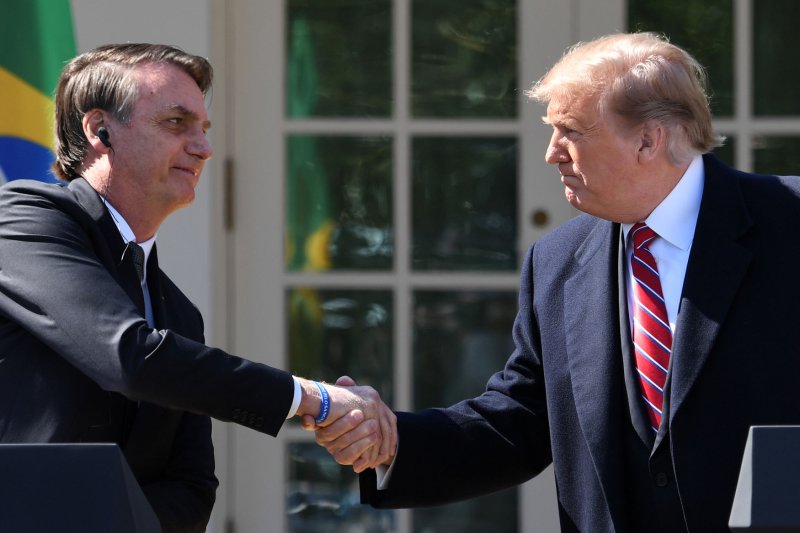1 of 3 | President Donald Trump (R) shakes hands with Brazilian President Jair Bolsonaro at a joint news conference in the Rose Garden at the White House on Tuesday. Photo by Pat Benic/UPI |
License Photo
March 19 (UPI) -- WASHINGTON -- President Donald Trump said the United States could be "a lot tougher" with future sanctions against Venezuela at a Tuesday press conference with Brazilian President Jair Bolsonaro.
As the two leaders decried socialism in the Western Hemisphere, Trump said the United States and Brazil were united in their opposition to the left-wing governments of Venezuela, Cuba and Nicaragua.
"The twilight hour of socialism has arrived in our hemisphere, and hopefully has arrived, that twilight hour, in our great country," Trump said. "The last thing we want in the United States is socialism."
Trump threatened to use military force against the government of Venezuelan President Nicolas Maduro and reiterated his administration's demand that the country's military abandon support for Maduro.
Bolsonaro refused to say whether he supported allowing the U.S. military to conduct operations in Venezuela from a base in Brazil, a move strongly opposed by Brazilian military officials influential in Bolsonaro's government.
While Brazil's military would not back a potential U.S. military intervention in Venezuela, the Trump administration would still likely succeed in overthrowing Maduro, according to Fulton Armstrong, a former U.S. national intelligence officer for Latin America.
"They set up confrontation after confrontation with the Maduro government, with hopes that the military would rise up and remove him, and so far, it's been a pretty systematic failure," Armstrong said. "So, what they do, like most people do when confronted with failure, is they hit their head against the wall even harder. Ultimately, at some point, the strategy and the tactics probably will come to succeed."
Future sanctions, like the one's hinted at by Trump on Tuesday, could further cripple Venezuela's economy and trigger a military overthrow of Maduro, Armstrong said.
"When you're advocating violence, you're blocking a country's legitimate need to sell their products, the need to do imports and feed their people and run their hospitals ... this is now your problem," Armstrong said, adding that "the moral responsibility" for Maduro's fall and its aftermath would lie with the United States.
The State Department sanctioned Venezuela's state-owned gold company Tuesday afternoon, accusing it of misusing the country's gold reserves to benefit Maduro's government. Any further sanctions against the Venezuelan government specifically, however, would require congressional approval.
While lawmakers from both parties have publicly supported Trump's sanctions, they have not introduced separate legislation sanctioning the country.
Trump also said he would consider giving Brazil full membership in NATO, something which the U.S. president has no authority to do and requires a consensus among all signatory countries.
Armstrong said a hypothetical entrance of Brazil into NATO "means little operationally" and would be "based on a short-term political objective."
Bolsonaro, who is famous for his provocative comments and sometimes violent opposition against Brazil's left-wing, echoed Trump's rhetoric on socialism in Latin America, saying he would stand with the United States against "gender ideology" and "fake news." Socialism, Bolsonaro added, had "nearly conquered Latin America" under populist, left-wing governments like Brazil's former President Lula da Silva.
Notwithstanding Bolsonaro's controversial positions, his growing relationship with Trump may receive little pushback from Democrats in Congress.
Rep. Eliot Engel, D-N.Y., chairman of the House Foreign Affairs Committee, said despite his concerns for Bolsonaro's rhetoric, he would give Bolsonaro "the benefit of the doubt," emphasizing Brazil's importance to the United States.
Shortly after Bolsonaro took office in January, however, Engel and other Democrats sent a letter calling on Secretary of State Mike Pompeo to condemn the new president's open hostility towards democracy and the rights of Brazil's LGBT community and indigenous population.
Armstrong said U.S. diplomats aim to make Trump's meeting with Bolsonaro "look good" politically to show that Trump has brought at least one Latin American country into the U.S. sphere of influence.
"They're both populists. They're both misogynists. They're both militarists," Armstrong said. "They both have a very far-right set of foreign policy views. I think those are the grounds for a natural friendship."
Elliott Abrams, the U.S. special representative to Venezuela, met with Russian officials in Rome on Tuesday to discuss the future of Venezuela. According to media reports, the talks ended with Russian officials insisting Moscow will continue to back Maduro as the legitimate president of Venezuela.















